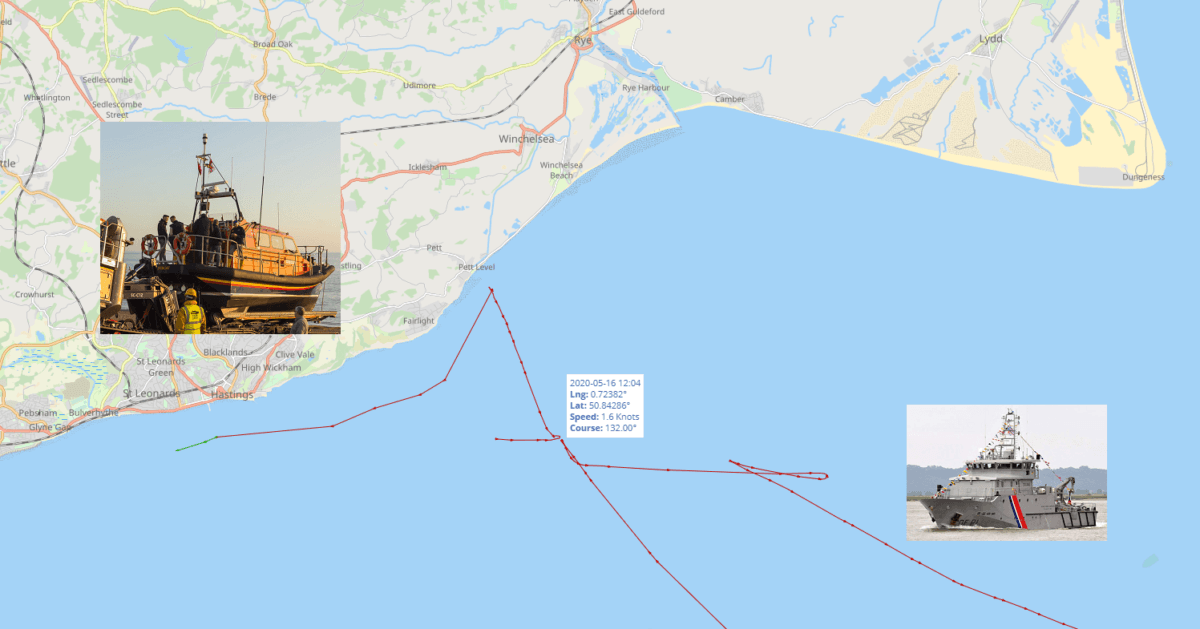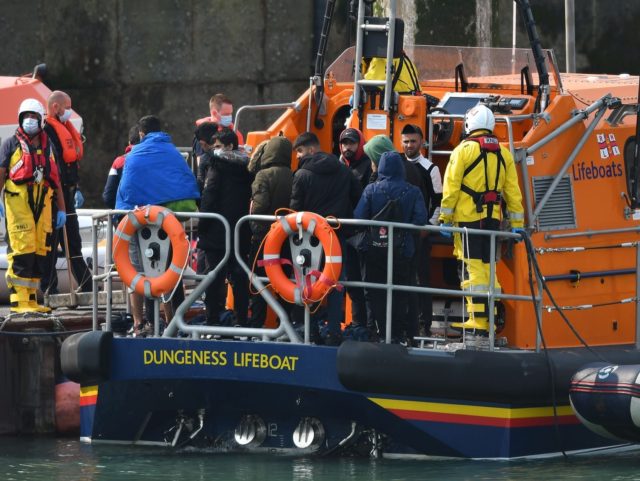The CEO of the Royal National Lifeboat Institution (RNLI) has defended the charity’s operations picking up boat migrants in the English Channel as “humanitarian work of the highest order”.
Mark Dowie, who spent roughly eight years with the Royal Navy and close to 20 as an executive with various banks including Baring Brothers, Standard Chartered, and UBS, made the comments after RNLI crew and migrants were allegedly heckled by members of the public, who have become frustrated with the government’s persistent failure to stop the ever-increasing waves of boat migrants months after Brexit and years after the crisis was first declared a “major incident” by then-Home Secretary Sajid Javid back in 2018.
Dowie, who receives a £160,000 a year salary from the RNLI, according to its website — although there was talk of cutting this to £80,000 in response to the coronavirus pandemic last year — insisted that “All decent people will see this as humanitarian work of the highest order” and that “Our crews should not have to put up with some of the abuse they received.”
He also made comments to the left-wing Guardian newspaper, widely interpreted as a dig at Nigel Farage for his warning that the RNLI — along with the Border Force and Royal Navy — has become a “migrant taxi service”.
“These islands have the reputation for doing the right thing and being decent societies, and we should be very proud of the work we’re doing to bring these people home safe”, Dowie said.
The Guardian did not elect to query Dowie’s designation of British shores as “home” for France-based migrants hailing primarily from the Balkans, Asia, and Africa in its report.
The RNLI has also posted videos on social media showcasing “Why The RNLI Rescues Migrants” with footage and stories of lifeboatmen interacting with women and children on board the charity’s boats. The cases illustrated may have been extraordinary, given Home Secretary Priti Patel recently confirmed that, in 2019, 87 per cent of migrants were men and 74 per cent were aged between 18 and 39.
Farage, for his part, hit back at the passive-aggressive messaging from the RNLI, which is funded by public donations, on social media and on his new evening show on GB News.
The former UKIP and Brexit Party/Reform UK leader, a keen sea angler, stressed his longstanding admiration for the lifeboatmen and past fundraising activity on their behalf, and said it was “to be regretted that the RNLI… increasingly is becoming a taxi service for the illegal gangs pushing migrants across into the English Channel”. He suggested the charity has in many ways been co-opted as “an arm of Border Force” — which, like the RNLI, does not take boat migrants back to France but collects them at sea and brings them the rest of the way to England.
Farage said this state of affairs had created “division within coastal communities” and disquiet among some RNLI volunteers and RNLI donors.
“I worry that the RNLI is doing the wrong thing,” he said, revealing that one lifeboatman has told him he is resigning from the Institution because constantly putting to sea to pick up migrants has impacted his capacity to run his business.

French warship Fourmentin comes to within four and a half miles of the British coast and meets with an RNLI all-weather rescue boat on Saturday 16th May 2020 / Image generated by Breitbart London with data from myshiptracking.com and open-source imagery
The picture painted by the RNLI and Mark Dowie of the migrants they are collecting — “Imagine being out of sight of land, running out of fuel, coming across incredibly busy shipping lanes when you’re frightened and you don’t know which direction you’re going in” — may be challenged by real-world shipping tracking data revealing the actual nature of one migrant-handover between the British and French governments, in which the RNLI appeared to be a willing partner.
Analysis of transponder data in 2020 exposed the fact that a French warship had closely escorted boat migrants far into British waters, where the vessel rendezvoused with an RNLI boat. The migrants safely handed over, the RNLI then escorted the boat to England, at every moment closely watched by a well-equipped military, coastguard, or life-saving vessel nearby.
French government ships were subsequently shown to have turned off their transponders after these at-sea meetings were revealed.
Brexit champion Farage this week accused RNLI bigwigs in Poole of having employed a PR firm — or at least PR tactics — to demonise him for having exposed the Channel crisis.
“All I was doing is pointing out the truth, but if you, the bosses in Poole, want to pick a fight with me, that’s fine by me — I’ve fought people bigger and uglier than you in the past,” he said.
The RNLI has indeed launched a considerable PR campaign in recent weeks, but not one meant to educate would-be illegal migrants that crossing the world’s single busiest waterway in unseaworthy boats with no sailing experience is extremely dangerous and puts not just the lives of fellow migrants but also lifeboatmen in considerable danger.
Unlike the RNLI’s domestic education work, which rightly focuses on helping people not get into trouble in the first place or needing to call upon the finite resources of the life-saving charity, the focus with respect to Channel migrants appears to be on shaping the opinions of the British public on immigration — including by courting journalists.
Several news pieces published in recent days followed an activity day for friendly journalists at the RNLI’s headquarters in Poole, where hacks were put on a rubber dinghy in the organisation’s own storm-simulator training pool.
Interestingly, many of the arguments made by Farage with respect to the RNLI and others actually exacerbating Channel crossings by making them easier and, as a result, encouraging more people to attempt them, were previously advanced by the European Union Border and Coast Guard Agency, Frontex, on search-and-rescue (SAR) missions near Libya.
“Both border surveillance and SAR missions close to, or within, the 12-mile territorial waters of Libya have unintended consequences,” the EU agency noted in its Risk Analysis for 2017.
“Namely, they influence smugglers’ planning and act as a pull … Dangerous crossings on unseaworthy and overloaded vessels were organised with the main purpose of being detected by EUNAVFOR Med/Frontex and NGO vessels,” it conceded.
“Apparently, all parties involved in SAR operations in the Central Mediterranean unintentionally help criminals achieve their objectives at minimum cost, strengthen their business model by increasing the chances of success.
“Migrants and refugees – encouraged by the stories of those who had successfully made it in the past – attempt the dangerous crossing since they are aware of and rely on humanitarian assistance to reach the EU”, Frontex noted.

COMMENTS
Please let us know if you're having issues with commenting.